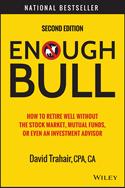Financial Independence Hub
In this summer’s series on the 7 eternal truths of personal finance, one of the articles was entitled Be an Owner, Not a Loaner, which reflects the usual financial industry advice that stocks are more likely to generate long-term investment returns than cash or bonds.
There is of course a contrary view to this eternal truth and it’s best contained in the new second edition of David Trahair’s book, Enough Bull, originally published early in 2009, right at the bottom of the financial crisis..
Trahair, a chartered accountant and author, could as easily have titled his book Be a Loaner, Not an Owner, because he’s adamant that stocks (i.e. equities), whether individual or pooled through mutual funds or ETFs, are just too risky for the average person.
The book cover includes a small image of a bull (as in a steer), so clearly the title Enough Bull is a double entendre: as in no more bullish prognostications on the stock market, as well as no more bovine excrement, whether dispensed by the animals or financial advisors.
Skeptical about the financial industry and its central belief in stocks

Trahair is skeptical of financial advisors, their compensation levels, mutual fund fees and much of the rest of the financial industry. Curiously, the book’s lone back-cover testimonial comes from someone who is both a financial planner and a believer in dividend-paying stocks or indexed portfolios that contain them: Boomer & Echo’s Robb Engen (a regular contributor to the Hub.)
I made similar observations about the book in my FP column when it was first published. Not much has changed since: Trahair says straight out in his new introduction his “opinions haven’t changed. I still stand by everything I said the first time – the stock market is no place to trust your hard-earned retirements savings in.” (sic)
Trahair is skeptical about a variety of “complex instruments” that made many people rich – financial industry insiders that is, not ordinary investors. Included in his list are collateralized debt obligations, mortgage-backed securities, non-bank asset-based commercial paper, income trusts and even mutual funds.
He wrote and revised the book because he says he’s angry: “The truth is that the whole subject of personal finance has been made complicated because it makes money for the people that run the financial system.”
Trahair is convinced you can create a secure retirement for yourself by eschewing stocks and embracing FDIC-insured Guaranteed Investment Certificates (GICs) And he lays down his “antidote,” a six-point plan for financial freedom. Here they are:
1.) Avoid personal financial disasters
Don’t invest in anything not guaranteed by the government, never borrow to invest and avoid complicated investment schemes.
2.) You don’t need the stock market or mutual funds
You don’t need to risk your money in stocks and you don’t need mutual funds, Trahair argues: simply use 100% government-guaranteed investment certificates.
3.) Buy a home and pay off the mortgage
This one I agree with wholeheartedly: as I write myself, the foundation of financial independence is a paid-for home. Trahair adds that you should “never risk your home for any kind of investment idea, no matter what.” I agree with this too.
4.) Reducing expenses doesn’t have to be painful
Trahair says investors should focus on the two biggest expenses: income tax and interest on debt. It may help to pay an expert to help you minimize your tax bill via income splitting etc. This is a valid suggestion as far as it goes, but I have to wonder: if you do as he suggests and put all your GICs and highly taxed interest income into RRSPs and TFSAs, what about non-registered savings? Surely non-registered investors would rather minimize their taxes on investment income by holding stocks that benefit from favorable tax treatments of dividends and capital gains?
5.) Forget RRSPs until your Debt Is Paid off
Trahair says you should forget about retirement saving until you have paid off student loans and bought a home, adding that you should pay off the mortgage before investing anything in an RRSP. This is okay advice for some young couples, but I would think most dual-income couples could start their RRSPs in parallel to an RRSP paydown program. While he mentions Tax Free Savings Accounts in passing, they don’t get much discussion compared to his views on RRSPs.
6.) Ask yourself if you really need an investment advisor
Trahair suggests that if you have already have one, but a bad one, you should find a good one. And if you can’t find a good one, “simplify your finances so you don’t need one at all.”
Suggestion # 6 is also an interesting one, given my own view that one role a financial advisor should play is to provide a second opinion on all things financial. The danger of going it alone in this case is that 99% of the financial advisors I know truly believe in stocks for the long run and being an owner, not a loaner. In other words, most advisors would probably dismiss Trahair’s all-GIC suggestion, although many may well side with him on getting out of debt.
The same advisors would probably tell you stocks have a better chance of beating inflation in the long run than GICs, which are as apt to have a real (net of inflation) rate of return of zero or even negative.
Trahair does raise the inflation issue once, on page 56, in a section entitled “How and why they bash GICs.” He does suggest these be held inside registered plans, where they can “retain the full 2.5% rate of return.” But he calls the “real rate of return is zero” argument “ a red herring: he’s more concerned about stock-market losses than losing to inflation.
As I said at the outset, this is a decidedly contrarian view to what most of the financial industry believes and preaches. Those who have advisors who do believe in the stock market might want to bounce some of this book’s main premises off of them and see what they think.
I doubt many will agree with the thrust of the book but perhaps there’s a happy medium somewhere here. For me, it would consist of overweighting registered vehicles in fixed-income GICs and their equivalents but I still believe that with both tax and inflation to be considered that stocks should be the dominant asset class in taxable plans.
True, this means bearing a constant level of anxiety about a possible crash. We’ll see if Trahair gets the last laugh.
Jonathan Chevreau runs the Financial Independence Hub and can be reached at jonathan@findependencehub.com


